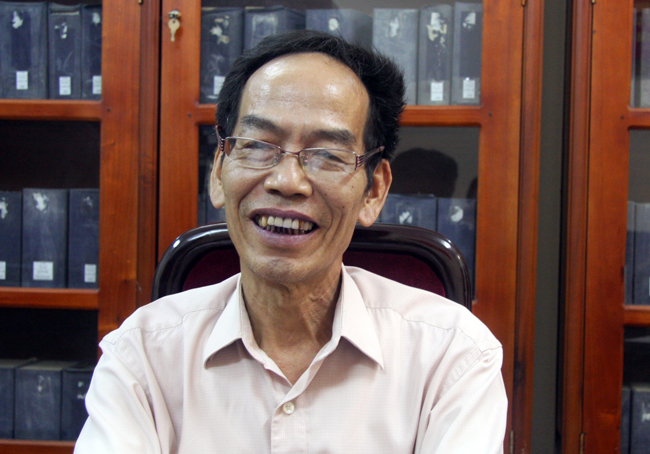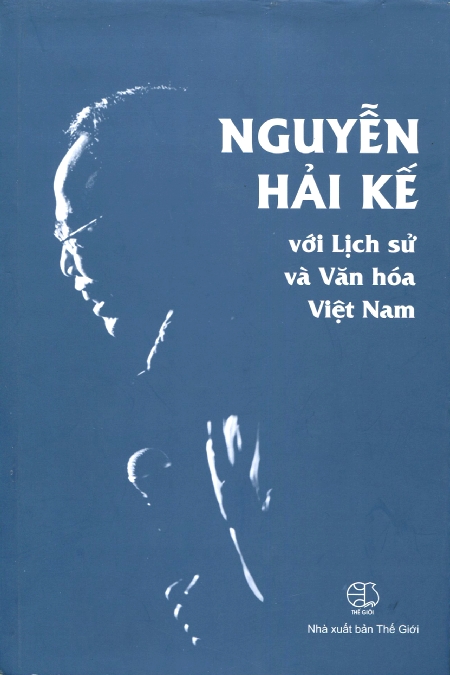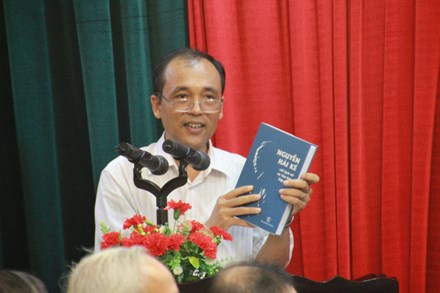

Late Associate Professor, Dr. Nguyen Hai Ke (former Head of the Department of History, University of Social Sciences and Humanities)/Photo: Bui Tuan
During his lifetime, Associate Professor, Dr. Nguyen Hai Ke published over 100 research works in the form of books, research articles, and presentations at scientific conferences at home and abroad. After Associate Professor Nguyen Hai Ke passed away, colleagues and students in the Faculty of History, Department of Cultural Studies and History of Vietnamese Culture collected and selected 54 most typical articles, according to the two main research topics that Associate Professor Nguyen Hai Ke pursued, History and Culture, to edit into the book "Nguyen Hai Ke with Vietnamese History and Culture".Therefore, this book is considered a cluster of research works by Associate Professor, Dr. Nguyen Hai Ke on the topic of Vietnamese History and Culture. The book was completed and published by The Gioi Publishing House in 2014. Recently, the work received the Hanoi National University Science and Technology Award for the period 2011-2015.

The project has just received the Hanoi National University Science and Technology Award for the period 2011-2015.
The book consists of 3 parts.
Part 1:From/and historical background,includes 16 articles on traditional Vietnamese historical issues that Associate Professor, Dr. Nguyen Hai Ke has spent a lot of time researching and evaluating. Although many of the topics mentioned in the first part are not new, the perspective and approach of Associate Professor, Dr. Nguyen Hai Ke have brought new, thorough, and sharp explanations to different aspects/issues of the Ly, Tran, Le So, Mac, and Le Trung Hung dynasties such as: issues about the Ly dynasty's homeland, the Ly dynasty's border policy; determining the location and scale of the Tran dynasty's Thien Truong palace and the role of this palace - the second capital of the Tran dynasty, second only to Thang Long - in the social, political, and historical life of Dai Viet in the 13th - 14th centuries; about the resistance wars against foreign invaders during the Tran and Le dynasties; the reclamation and reconstruction of Dai Viet after the war; about trade and commerce...
Not only stopping at the topic of the war against foreign invaders like many other historians, the complex post-war topic, sensitive to the post-war lessons and the policy of national reconciliation after the victory against the Ming is also of special interest to Associate Professor, Dr. Nguyen Hai Ke - something that few researchers have mentioned. Particularly for the Nguyen Dynasty, the articles in the book "Nguyen Hai Ke with Vietnamese History and Culture”Discuss the existing problems of Vietnamese Confucian intellectuals in the 19th century as well as the inadequacies of the Vietnamese examination system during this period.
Part 2:To/and culture: Theses, spaces,Includes 28 articles by the author on Vietnamese cultural history such as: the relationship between culture and the natural environment; Vietnamese cultural identity, the nature of Vietnamese patriotism, the source of Vietnamese strength; issues related to Confucianism and Confucianism in Vietnam (characteristics, origin of Confucianism, the nature of Confucian education...); traditional Vietnamese village culture; worship of gods in the Northern Delta; cultural - social - political issues of the regions: Thang Long - Hanoi; Hai Phong, Nam Dinh, Thanh Hoa, Nam Bo...
Occupying a large space in part 2, the topic of cultural contact and exchange is frequently mentioned by the author to help readers better understand the identity and cultural character of Vietnam in many aspects such as the history of the formation of writing in Vietnam, cultural contacts and exchanges between Vietnam and India, China and Western civilization, forms, nuances and fields of contact in Vietnamese culture...; the role of Thang Long - Hanoi as a bridgehead in the process of cultural contact and exchange.
Part 3:Some faces,includes 10 articles about historical figures of ancient dynasties (Ly, Tran, Le So, Le Trung Hung...) and present. They are kings Le Hoan, Ly Cong Uan; famous mandarins who contributed much to the court such as Nguyen Trung Ngan, Nguyen Trai; the famous and profound Zen master Khuong Viet Ngo Chan Luu; the historian Ngo Si Lien; the person who contributed to the cause of educational reform in the Le - Trinh period Nguyen Nghiem; the Trang Trinh Nguyen Binh Khiem; and the young faces of Thang Long - Hanoi.

The book was selected, edited and published by the staff of the Faculty of History. The book is not only a valuable scientific work but also a respectful and loving sentiment from generations of colleagues and students of the Faculty to the Teacher who has passed away.
In the photo is Associate Professor Dr. Vu Van Quan - Head of the History Department at the book introduction in 2014.
In the research articles on History and Culture of Associate Professor, Dr. Nguyen Hai Ke, his interpretations of thorny historical issues are often not emotional or speculative, but are often based on systematic research methods. He is passionate about applying interdisciplinary, multidisciplinary and transdisciplinary thinking and research methods in his research. Reading the articles in this book, readers will realize that the scientific values of the articles are built from specific research methods such as: using research results of archaeology, Han Nom stele documents, village regulations, genealogies, documents from official histories, unofficial histories... to decode historical, cultural and traditional social issues. Associate Professor, Dr. Nguyen Hai Ke often uses statistical and quantitative methods from original documents - almost all of his articles in this book have statistical tables - to obtain objective qualitative comments. In addition, he also uses knowledge of geography, natural environment, ecology... to explain issues related to social movements, cultural issues, and Vietnamese people. It is from the use of different methods in approaching the problem that the research conclusions in the articles of this book become objective, dialectical, avoiding general assessments.
Although this research work is a collection of many articles with a short capacity, there are many arguments, proofs and historical points in the articles of Associate Professor, Dr. Nguyen Hai Ke that have suggestive value and long-term theoretical orientation, many issues are valuable for future contemplation. Many of his explorations in historical and cultural issues in this book have become great theses, long-term research orientations that future generations of researchers can develop and implement.
According to Professor, Dr. Le Hong Ly (Institute of Cultural Studies - Vietnam Academy of Social Sciences): The book "Nguyen Hai Ke with History and Culture”clearly shows the spirit, ideas and very unique scientific style of Nguyen Hai Ke, which also proves that the editorial team of the Faculty of History was very dedicated, understood the teacher and all the factors that created a work, although not a monograph, still has great scientific value.
Professor Le Hong Ly was also particularly impressed with the way the works and sections of the book were named: “From/ and the foundation of History”, “To/ and Culture: Thesis, Several Spaces”, “Some Faces”, each word was carefully selected; emphasized; and it was also completely suitable and consistent with the way Associate Professor Nguyen Hai Ke titled the articles, such as “Hai Phong - the “forgotten” land of the early Le Dynasty”, “There is a Van Don in the middle of Yen Bang, Yen Quang is not quiet”, “The unique national people - The rearview mirror of the Confucianism examination system of Vietnam”, “The East Sea - the myriad of paths of contact and cultural exchange of Vietnam”…
A prominent feature is that Associate Professor Nguyen Hai Ke's articles are always full of historical data, using tables, statistics, and very careful measurements. He is also a person with many brilliant ideas. He saw the post-war conflicts, saw the "tragedies" of Confucian intellectuals, saw the opportunities and challenges of the process of cultural contact and exchange, the cultural values received from Chinese culture that have been transformed and changed...
Prof. Dr. Nguyen Quang Ngoc (Institute of Vietnamese Studies and Development Sciences, VNU) said: projectNguyen Hai Ke with Vietnamese History and Culture”is a collection of the best and most outstanding articles by Associate Professor, Dr. Nguyen Hai Ke. Originally a researcher of History, and on the basis of that historical knowledge, Associate Professor. Nguyen Hai Ke chose to do more in-depth and specialized research on issues of Vietnamese Culture. That underground stream has flowed throughout his scientific life and has been crystallized in this book. The studies on History and Culture of Associate Professor, Dr. Nguyen Hai Ke are selected in the book "Nguyen Hai Ke with Vietnamese History and Culture”are works of scientific value, including many elaborate and serious research results, many scientific ideas, demonstrating the erudite thinking and multidisciplinary and interdisciplinary approach of Associate Professor Nguyen Hai Ke.
The research of Associate Professor Nguyen Hai Ke also helps to open up scientific ideas for the next generations of researchers to continue to explore and clarify the issues and arguments that Professor Nguyen Hai Ke has mentioned in each event and sentence. Finally, this book is also the most heartfelt feelings that relatives, colleagues, and generations of students have for a scientist full of enthusiasm, passion for the profession, and love for people and life.
http://www.ussh.vnu.edu.vn/d4/news/Nguoi-thay-giao-thuy-chung-voi-nghe-1-12235.aspx
http://ussh.vnu.edu.vn/thay-luon-trong-trai-tim-moi-nguoi/7531
Author:Thanh Ha (synthesis)
Newer news
Older news